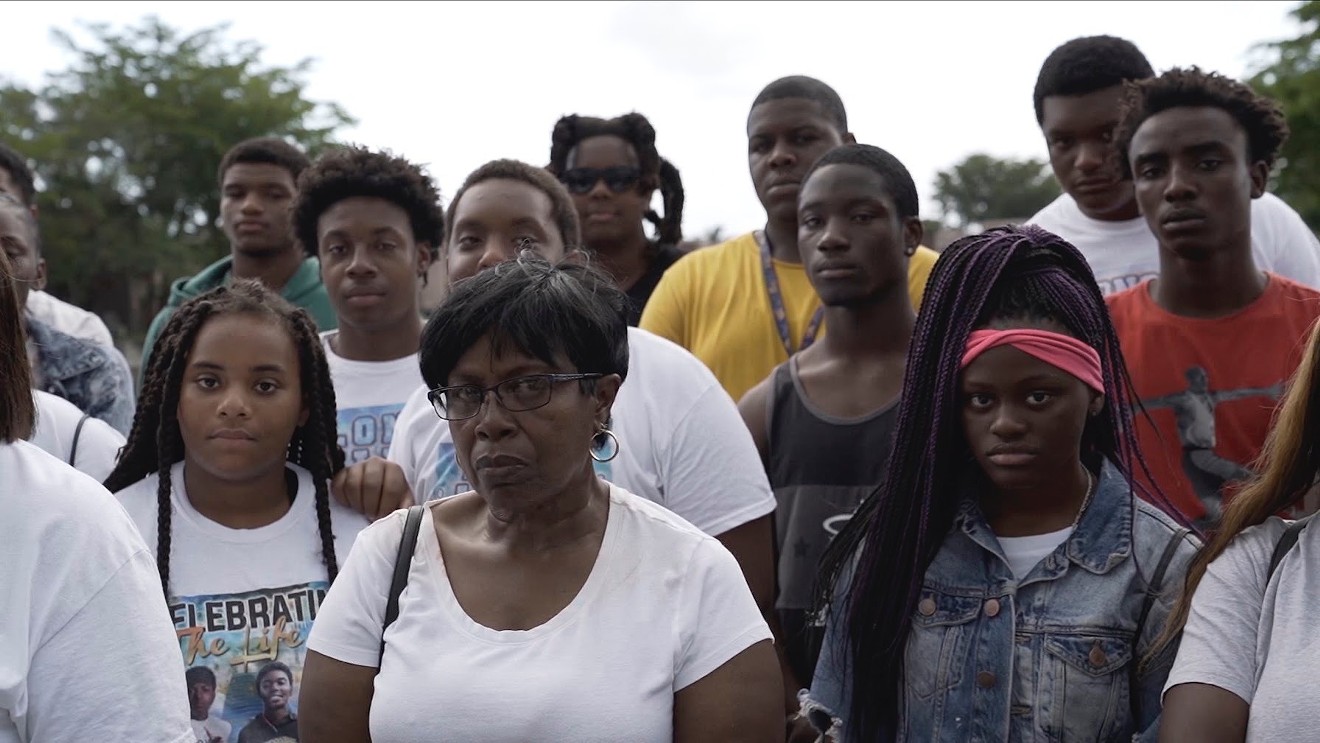On an overcast March evening, rescue divers surfaced from a shallow canal in Broward County with the lifeless body of 16-year-old Damain Jordan Martin. The teen had disappeared into the dark waters just an hour earlier. He was found unarmed and largely unscathed save for a few small lacerations on his forearm. No larger than a quarter each, those tiny cuts poke major holes in officials' determination that Martin, who was known to friends and family as a skilled swimmer, died of an accidental drowning.
Evidence presented in a new short documentary by the Intercept and the Florida Center of Investigative Reporting suggests a shock from a Sunrise police Taser might have led to Martin's untimely death. In Drowning by Sunrise, Miami-based journalists Jason Jeffers and Jess Swanson take on an investigation the local media has long since abandoned. The two probe Sunrise officials' account of events while providing a platform for a distraught community desperate for answers.
"We had questions, the community had questions, but there was a degree of disregard from the authorities that compelled us to keep looking into this case," says Jeffers, who's co-executive director of the Miami-based Caribbean filmmaking collective Third Horizon. "I'm a black man myself. I know what encounters with police can be like."
Known to his friends and family as Dame or D.J., Martin was one of four teens who fled from a stolen vehicle after being pulled over by Sunrise police the evening of March 8, 2019. Martin was athletic and ran more than half a mile before the foot chase came to a gruesome end. After jumping into a canal and swimming away, Martin suddenly disappeared under the water. A witness said he surfaced twice, screaming, "Help me! Help me!" He did not come up a third time.
According to a police report, officers and fire-rescue personnel threw bags and ropes into the water in an attempt to save Martin. One witness said a police officer nearly dived into the canal after the teen but was instructed not to do so. What's undeniable is that Martin drowned. Whether it was accidental is the defining question of Drowning by Sunrise.
Sunrise Officer Terrance Walker fired two Taser probes while chasing Martin. The first was found 33 feet from the canal bank. The second was never recovered. Crime scene photos displayed in the documentary show a Taser cartridge roughly five feet from the seawall. Yet Broward officials said they found no evidence of Taser probe contact and declared Martin's death an accidental drowning.
However, the autopsy report tells a different story, according to Dr. Angelique Corthals, a forensic anthropologist at the John Jay College of Criminal Justice at the City University of New York.
"The autopsy is very, very thorough. However, in the report, there's a missing detail, a missing wound on the forearm of Damain. If you are investigating a potential case of Taser, you definitely [are] looking for this type of injury," Corthals told filmmakers. "As thorough as the pictorial evidence is in the autopsy report, the report does not mention this wound."
The documentary notes the Broward medical examiner's report mentions "faint" and "superficial" wounds on the arm, but it does not attribute them to a Taser. When the filmmakers asked the medical examiner about the discrepancy, he stood by his report.
"Once we confirmed that the Taser was deployed, we couldn't make sense why an officer would deploy so close to water," says Swanson, a senior editor at the in-flight magazine American Way and a former New Times staff writer. "I almost fell over at my desk at work when Dr. Corthals started listing discrepancies she found between the written autopsy report and the images."
Neither the Broward Sheriff's Office nor the Sunrise Police Department immediately responded to New Times' requests for comment.
Beyond scrutinizing the actions of police in the leadup to Martin's death, Drowning by Sunrise also offers a glimpse into the community he left. Swanson and Jeffers interviewed upward of 25 people for the documentary, including Damain's mother, Tequila Martin, who said Sunrise Police did not offer her any condolences following her son's death, much less answers to her questions.
"I'm very angry. It needs to stop," Debbie Thomas, Martin's godmother, says in the documentary. "He didn't do nothing but run. All he did was run. So why would you do a young man like that?"
Swanson says a Black Lives Matter activist in Broward County who'd had trouble keeping local media interested in the story approached her about Martin's death. Juggling full-time jobs, Swanson and Jeffers worked during lunch breaks, in the evenings, and on weekends. It soon became clear they were the only people still investigating the story.
"I hope our investigation raises awareness of the fact that this case demands a second or third look," Jeffers says. "This was a young man whose life had value, and it is crucial that it's treated now, after his passing, with that same value."
[
{
"name": "GPT - Billboard - Slot Inline - Content - Labeled - No Desktop",
"component": "16971022",
"insertPoint": "2",
"requiredCountToDisplay": "2"
},{
"name": "Editor Picks",
"component": "15769925",
"insertPoint": "4",
"requiredCountToDisplay": "1"
},{
"name": "Inline Links",
"component": "16575154",
"insertPoint": "8th",
"startingPoint": 8,
"requiredCountToDisplay": "7",
"maxInsertions": 25
},{
"name": "GPT - Rectangle 2x - Slot Auto-select - Labeled",
"component": "15782206",
"insertPoint": "8th",
"startingPoint": 8,
"requiredCountToDisplay": "7",
"maxInsertions": 25
},{
"name": "Inline Links",
"component": "16575154",
"insertPoint": "8th",
"startingPoint": 12,
"requiredCountToDisplay": "11",
"maxInsertions": 25
},{
"name": "GPT - Leaderboard to Tower - Slot Auto-select - Labeled",
"component": "15782207",
"insertPoint": "8th",
"startingPoint": 12,
"requiredCountToDisplay": "11",
"maxInsertions": 25
}
]











